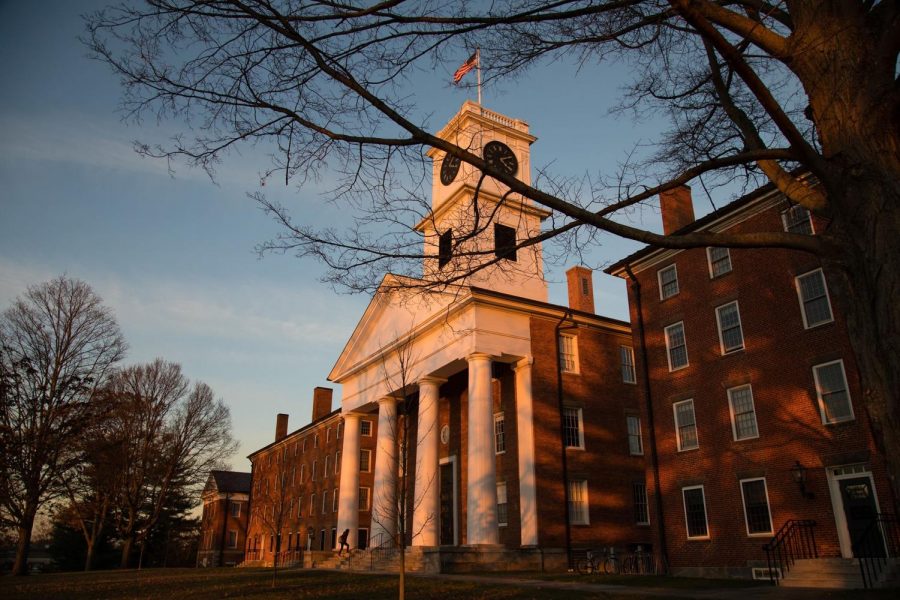In an attempt to interpret Russian interference in the 2016 presidential election, professor Steven Lee took a look at the societal mindset of Russia as a nation for answers.
Lee, an associate professor in the department of English at the University of California at Berkeley, explored the meddling at Amherst College on Thursday afternoon. Lee believes that a series of aspects about Russian culture, as well as historical events, are the foundation for Russia’s mentality and, consequently, the explanation as to why Russians “trolled” American social media around the time of the election.
Prefacing the talk, Lee expressed he does not believe the Russian interference via social media alone had any particular bias toward either presidential candidate.
“What’s most important here isn’t taking sides, but trying to understand how both sides had been manipulated by an outside party,” Lee said.
Drawing upon history, Lee referenced several cases dating back to the early 1900s and beyond of similar Russian interference.
“A few journalists have noted Cold War precedents for such manipulation. For instance, in advance of the 1984 Summer Olympics in L.A.,” Lee said, “the KGB allegedly distributed leaflets threatening athletes from Africa and Asia with KKK attacks; however, beyond such underhanded deeds, the Soviet Union had a long and sometimes beneficial record of highlighting racism in the U.S.”
Juxtaposing a negative impact of tampering, Lee then provided a positive example of Russian interference in regard to American racism, aiming to prove that Russia holds no bias in American politics.
“In the 1930s Jim Crow, black lynchings and the Scottsboro Trialwere heavily covered in Soviet media…and luminaries like Langston Hughes and Paul Robeson drew inspiration from Soviet claims that racism had been eliminated within its borders,” Lee said.
Linking history to the present, Lee braided the recent interferences into the web of the past to illustrate the immense network of seemingly nonsensical mischief conducted by Russia.
“The Russian troll farm in Petersburg, known as the Internet Research Agency, created several social media accounts like…the Facebook account ‘Blacktivist,’ supporting the Black Lives Matter movement,” Lee said. “This account gained 360,000 likes by circulating actual accounts of police brutality and by publicizing and organizing rallies…Russian trolls also created accounts that fanned white nationalist sentiments, for example, the Facebook account ‘Stop All Invaders.’”
Lee described these interferences as the emergence of a “new Cold War” in the modern era, which is fusing with “new culture wars” to cause social chaos in the United States.
According to Lee, Russia has claimed independence from the majority of social concerns that have plagued the U.S., such as racism and sexism, throughout modern history. Therefore, the very notion of the meddling is a stance of superiority on Russia’s behalf in opposition to the United States.
Lee referenced a popular example often given as evidence of the Russian mentality surpassing social issues, a late Russian Korean punk artist named Viktor Tsoi. Tsoi, who was well known for abandoning his Korean roots, is sometimes argued to have done so due to threats of Korean deportation in Russia and anti-Korean sentiments. However, others argue Tsoi acted in this manner because he was Russian and that identification superseded all others.
Dale Peterson, a retired Amherst College professor of English and Russian, said that he felt Tsoi “seems to exist in the interspecies of given identities and given identifications that he performs at the edge of alienation,” which related to a “larger cultural collective issue.”
“How does one in daily life manifest the edge of alienation to display forms of not quite identifying?” Peterson asked, “I think there is a possibility of generations of young Americans and young Russians drifting into that way of being.”
Lee responded to Peterson by saying that Tsoi, as an example, “forces us to think across these racial boundaries,” as “intrinsic alienation.”
Relating this intrinsic alienation to the discussion of the United States, Lee said that since the 2008 election of Barack Obama, disappointments in structural inequity prompted cultural wars.
“For liberals and some on the left, initial optimism about a post-racial society gave way to disappointment that’s structural equity remained with us, so, the project became to protest this inequity and particularly its racist and sexist manifestations,” Lee said.
He continued, “In contrast for those on the right, identity politics also emerged from basic structural inequity, but here took the form of a nativist desire to restore the 1950s and thus, reverse the gains of late-20th century liberal multiculturalism.”
In response to Lee’s ideas of multiculturalism, Valentina Paskar, a language assistant in the Russian department at Amherst College, asked, “What do you think changed between the period where U.S. criticism of Russia and Russian criticism of the U.S. was constructive in the way that it caused reforms in both countries, and the current situation, where we think of Russian meddling in the election as destructive and chaotic?”
“It was always considered destructive…the dark side of that history…Russian propaganda directly contributing to civil rights reform,” Lee responded. “The dark side of that is that in the American South, the people wishing for civil rights reforms were called communists… if you wanted integration, you were a communist… it was never something that was welcomed though, so there isn’t a clear turning point.”
Andrea Hanley can be reached at [email protected].




















NITZAKHON • Apr 9, 2018 at 9:08 am
Why Did the Democratic South Become Republican?
https://www.youtube.com/watch?v=UiprVX4os2Y
The Inconvenient Truth About the Republican Party
https://www.youtube.com/watch?v=OURy5WFp0zk
NITZAKHON • Apr 9, 2018 at 9:06 am
The Democrats were the party of the Confederacy, of slavery, of the KKK…
The Inconvenient Truth About the Democratic Party
https://www.youtube.com/watch?v=g_a7dQXilCo&t=6s